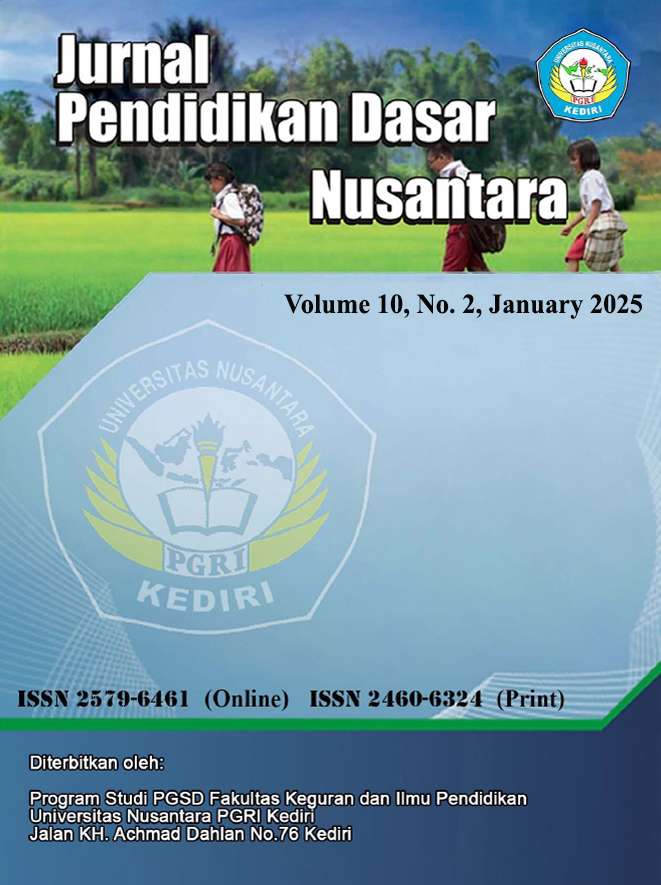Improving Students' Communication Skills and Understanding of Equivalent Fractions Through Project Based Learning With Toast Maker
DOI:
https://doi.org/10.29407/jpdn.v10i2.24413Keywords:
PjBL, Equivalent Fractions, Mathematical UnderstandingAbstract
This study aims to explore the effectiveness of the Project-Based Learning (PjBL) model in improving students' understanding of equivalent fractions and their communication skills at SD Muhammadiyah 4 Malang. Through the "Toast Maker" project, fourth-grade students were involved in practical activities that allowed them to apply the concept of equivalent fractions in real contexts. The research method used was quantitative with an experimental design, involving 26 students who were divided into two groups: an experimental group that implemented PjBL and a control group that used conventional learning methods. Data were collected through pre-tests and post-tests to measure improvements in students' understanding, as well as presentation assessments to evaluate communication skills. The results showed that the average score of students' understanding increased from 55 in the pre-test to 80 in the post-test, with the percentage of learning completion increasing from 38% to 92%. In addition, the average group presentation score reached 85, indicating that students were able to convey their project results well. Qualitative feedback from students also showed increased engagement and motivation during the learning process. This study concludes that the implementation of the PjBL model is not only effective in improving students' academic understanding but also contributes to the development of social and communication skills that are important for their personal development.
Downloads
References
Ahmad, Ratu Perwira Negara Habib, Riska Ayu Kurniawati Kiki, and Primajat Gilang. 2021. “Analisis Kesulitan Belajar Siswa Madrasah Ibtidaiyah Dalam Memahami Soal Cerita Pada Materi Pecahan.” Jurnal Mahasantri 1(2).
Bell, Stephanie. 2010. “Project-Based Learning for the 21st Century: Skills for the Future.” The Clearing House: A Journal of Educational Strategies, Issues and Ideas 83(2). doi: 10.1080/00098650903505415.
Efendi, Mohammad, Dawud Dawud, Imam Suyitno, Moh. Ainin, Muhaiban Muhaiban, A. Syukur Ghazali, Nur Mukminatien, Utami Widiati, Imam Asrori, Sumadi Sumadi, Nurul Murtadho, Sri Rachmajanti, Mohamad Amin, Gatot Muhsetyo, Danardana Murwani, Cholis Sa’dijah, Sri Umi Mintarti Widjaja, Hadi Suwono, Waras Kamdi, Syaad Patmanthara, Parno Parno, Lia Yuliati, Abdur Rahman As’ari, and Endah Tri Priyatni. 2021. Kumpulan Pidato Pengukuhan Guru Besar Universitas Negeri Malang (UM) Mereka Pembelajaran Inovatif.
Elvina, M., and S. Ahmad. 2019. “Pengaruh Model Pembelajaran Project-Based Learning Terhadap Hasil Belajar Pecahan Senilai Siswa Kelas IV Sekolah Dasar.” E-Jurnal Inovasi Pembelajaran Sekolah ….
Faridah, Nadia Risya, Eka Nur Afifah, and Siti Lailiyah. 2022. “Efektivitas Model Pembelajaran Project Based Learning Terhadap Kemampuan Literasi Numerasi Dan Literasi Digital Peserta Didik Madrasah Ibtidaiyah.” Jurnal Basicedu 6(1). doi: 10.31004/basicedu.v6i1.2030.
Harianja, Joko Krismanto. 2020. “Model Pembelajaran Project Based Learning Dalam Meningkatkan Keterampilan Berpikir Kreatif Dan Komunikasi Matematis Siswa.” JARTIKA Jurnal Riset Teknologi Dan Inovasi Pendidikan 3(2). doi: 10.36765/jartika.v3i2.114.
Nisfa, Nia Lailin, Lita Latiana, Yuli Kurniawati Sugiyo Pranoto, and Diana Diana. 2022. “Pengaruh Pendekatan Pembelajaran Project Based Learning (PjBL) Terhadap Kemampuan Sosial Dan Emosi Anak.” Jurnal Obsesi : Jurnal Pendidikan Anak Usia Dini 6(6). doi: 10.31004/obsesi.v6i6.3032.
Paneo, Herman. 2007. “Pengaruh Umpan Balik Evaluasi Formatif Dan Kepribadian Siswa Terhadap Hasil Belajar Matematika.” Jurnal Pendidikan Dan Kebudayaan 13(67). doi: 10.24832/jpnk.v13i67.394.
Pania, Fania Mulyawati, Reksa Adya Pribadi, and Ujang Jamaludin. 2023. “Karakteristik Belajar Dan Pembelajaran Anak Usia Sekolah Dasar (SD).” Didaktik : Jurnal Ilmiah PGSD STKIP Subang 9(2). doi: 10.36989/didaktik.v9i2.1131.
Purwati, Selvira, and Rahmawati Darussyamsu. 2021. “Model Pembelajaran Problem Based Learning Untuk Meningkatkan Kemampuan Komunikasi.” Prosiding Seminar Nasional Biologi 1(1).
Rohaeti, Euis Eti, Haris Hendriana, and Utari Sumarmo. 2019. Pembelajaran Inovatif Matematika Bernuansa Pendidikan Nilai Dan Karakter.
Saragih, Marice, Risma Hartati, Ropinus Sidabutar, and Rini Wati Sembiring. 2021. “Penerapan Penggunaan Media Pembelajaran Video Interaktif Untuk Meningkatkan Motivasi Belajar Di Sekolah Yabes School Medan.” Jurnal Widya 2(1). doi: 10.54593/awl.v2i1.10.
Sohilait, Emy. 2021. “Pembelajaran Matematika Realistik.” OSF Preprints.
Sugiyono. 2017. “Metode Penelitian Pendidikan Pendekatan Kuantitatif, Kualitatif, Dan R&D Sugiyono.”
Suwarto, Suwarto. 2018. “Konsep Operasi Bilangan Pecahan Melalui Garis Bilangan.” Mosharafa: Jurnal Pendidikan Matematika 7(3). doi: 10.31980/mosharafa.v7i3.73.
Undari, Mayrisa, Darmansyah, and Desyandri. 2023. “Pengaruh Penerapan Model Pjbl (Project-Based Learning) Terhadap Keterampilan Abad 21.” Jurnal Tunas Bangsa 10(1). doi: 10.46244/tunasbangsa.v10i1.1970.
Yulia, Cut Morina Zubainur, and Rahmah Johar. 2019. “Keterlibatan Perilaku Siswa Dalam Pembelajaran Matematika Melalui STEM-PjBL Di SMPN 2 Banda Aceh.” Jurnal Ilmiah Mahasiswa Pendidikan Matematika 4(1).
Zulkarnaen, Zulkarnaen, Junita Dwi Wardhani, Sri Katoningsih, and Tri Asmawulan. 2023. “Manfaat Model Pembelajaran Project Based Learning Untuk Pendidikan Anak Usia Dini Dan Implementasinya Dalam Kurikulum Merdeka.” Jurnal Bunga Rampai Usia Emas 9(2). doi: 10.24114/jbrue.v9i2.52951.
Downloads
Published
Issue
Section
License
Copyright (c) 2025 Gancar Pramistri Ambawono, Setiti Rahayuningsih Rahayuningsih, Siti Inganah (Author)

This work is licensed under a Creative Commons Attribution-ShareAlike 4.0 International License.
Authors who publish with this journal agree to the following terms:
- Copyright on any article is retained by the author(s).
- The author grants the journal, the right of first publication with the work simultaneously licensed under a Creative Commons Attribution License that allows others to share the work with an acknowledgment of the work’s authorship and initial publication in this journal.
- Authors are able to enter into separate, additional contractual arrangements for the non-exclusive distribution of the journal’s published version of the work (e.g., post it to an institutional repository or publish it in a book), with an acknowledgment of its initial publication in this journal.
- Authors are permitted and encouraged to post their work online (e.g., in institutional repositories or on their website) prior to and during the submission process, as it can lead to productive exchanges, as well as earlier and greater citation of published work.
- The article and any associated published material is distributed under the Creative Commons Attribution-ShareAlike 4.0 International License
































